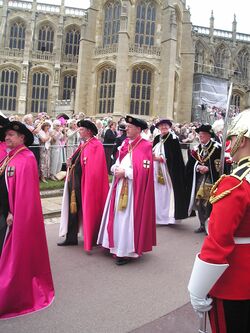Difference between revisions of "Chancellor of the Order of the Garter"
(Created page with "{{employment |wikipedia=https://en.wikipedia.org/wiki/Chancellor_of_the_Order_of_the_Garter |start= |constitutes= }} {{SMWDocs}} ==References== {{reflist}} {{Stub}}") |
(unstub) |
||
| Line 1: | Line 1: | ||
{{employment | {{employment | ||
|wikipedia=https://en.wikipedia.org/wiki/Chancellor_of_the_Order_of_the_Garter | |wikipedia=https://en.wikipedia.org/wiki/Chancellor_of_the_Order_of_the_Garter | ||
| − | |start= | + | |image=Officers of the Order of the Garter.JPG |
| + | |image_caption=Officers of the Order of the Garter (left to right): Secretary (barely visible), Gentleman Usher of the Black Rod, Garter Principal King of Arms, Register, Prelate, Chancellor | ||
| + | |start=1348 | ||
|constitutes= | |constitutes= | ||
| + | |description=An officer of the English chivalric [[Order of the Garter]] | ||
}} | }} | ||
| + | The '''Chancellor of the Order of the Garter''' is an officer of the [[Order of the Garter]], an order of chivalry founded by [[Edward III]] of England in [[1348]]. It is the most senior order of knighthood in the British honours system, outranked in precedence only by the [[Victoria Cross]] and the [[George Cross]]. | ||
| + | |||
| + | The position of Chancellor was to be second in seniority to the Prelate and was granted to [[Richard Beauchamp]], Bishop of Salisbury, and his successors in that position. The unbroken succession of Bishops of Salisbury came to an end in [[1551]] when Sir [[William Cecil]] was made Chancellor by [[Edward VI]], after which a succession of lay Chancellors were appointed. | ||
| + | |||
| + | Following a number of petitions by successive Bishops of Salisbury, their right to hold the position was conceded in [[1669]] and on the death of Henry de Vic the honour reverted to the Bishops of Salisbury. | ||
| + | |||
| + | 1837-1937, the office of Chancellor belonged to the Bishop of Oxford (but that year the outgoing bishop, [[Thomas Banks Strong]], had been outspoken in the abdication crisis of Edward VIII), and the title was withheld from his successors. | ||
| + | |||
| + | ===Knights Companion Chancellors=== | ||
| + | *1937–1943: [[William Cavendish-Bentinck, 6th Duke of Portland|The Duke of Portland]] | ||
| + | *1943–1959: [[E. F. L. Wood, 1st Earl of Halifax|The Earl of Halifax]] | ||
| + | *1960–1972: [[Robert Gascoyne-Cecil, 5th Marquess of Salisbury|The Marquess of Salisbury]] | ||
| + | *1972–1977: [[Charles Lyttelton, 10th Viscount Cobham|The Viscount Cobham]] | ||
| + | *1977–1994: [[John Nevill, 5th Marquess of Abergavenny|The Marquess of Abergavenny]] | ||
| + | *1994–2012: [[Peter Carington, 6th Baron Carrington|The Lord Carrington]] | ||
| + | *2012–present: [[James Hamilton, 5th Duke of Abercorn|The Duke of Abercorn]] | ||
| + | |||
{{SMWDocs}} | {{SMWDocs}} | ||
==References== | ==References== | ||
{{reflist}} | {{reflist}} | ||
| − | |||
Latest revision as of 11:36, 15 April 2021
 Officers of the Order of the Garter (left to right): Secretary (barely visible), Gentleman Usher of the Black Rod, Garter Principal King of Arms, Register, Prelate, Chancellor | |
| Start | 1348 |
| An officer of the English chivalric Order of the Garter | |
The Chancellor of the Order of the Garter is an officer of the Order of the Garter, an order of chivalry founded by Edward III of England in 1348. It is the most senior order of knighthood in the British honours system, outranked in precedence only by the Victoria Cross and the George Cross.
The position of Chancellor was to be second in seniority to the Prelate and was granted to Richard Beauchamp, Bishop of Salisbury, and his successors in that position. The unbroken succession of Bishops of Salisbury came to an end in 1551 when Sir William Cecil was made Chancellor by Edward VI, after which a succession of lay Chancellors were appointed.
Following a number of petitions by successive Bishops of Salisbury, their right to hold the position was conceded in 1669 and on the death of Henry de Vic the honour reverted to the Bishops of Salisbury.
1837-1937, the office of Chancellor belonged to the Bishop of Oxford (but that year the outgoing bishop, Thomas Banks Strong, had been outspoken in the abdication crisis of Edward VIII), and the title was withheld from his successors.
Knights Companion Chancellors
- 1937–1943: The Duke of Portland
- 1943–1959: The Earl of Halifax
- 1960–1972: The Marquess of Salisbury
- 1972–1977: The Viscount Cobham
- 1977–1994: The Marquess of Abergavenny
- 1994–2012: The Lord Carrington
- 2012–present: The Duke of Abercorn